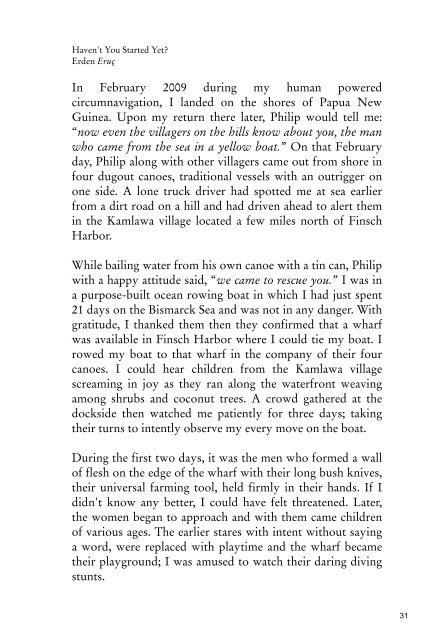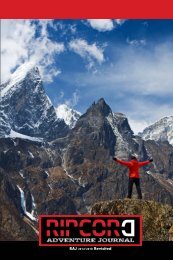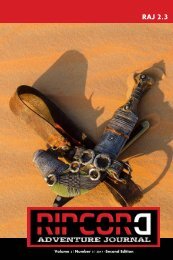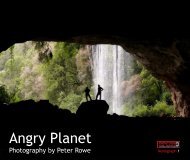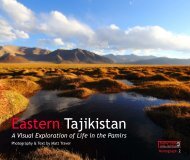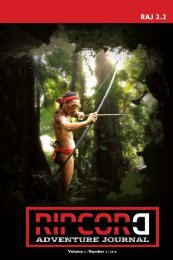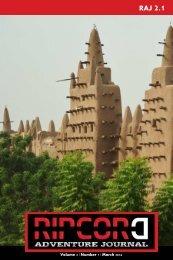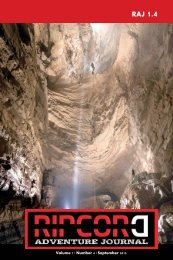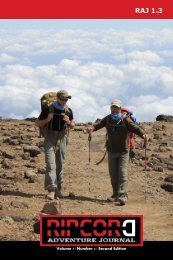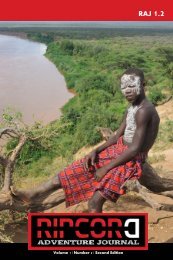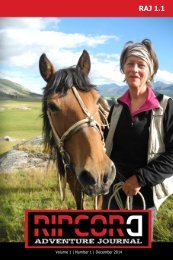Ripcord Adventure Journal 2.4
Our final issue of volume 2 is quite a mixture of adventure and exploration of the world's polar regions, deserts, oceans, mountains and jungles. In our Guest Editorial, Leon McCarron ventures in to the hills of Jordan as part of his 1000-mile journey on foot, across the Middle East, when he encounters an unexpected musical interlude on a lonely hillside. Planning is essential for major expeditions, even more important to have several back-up plans in case the first one or two, or three do not pan out as expected. Mark Wood brings us behind the scenes of planning for a polar expedition. Technology in the classroom has been touted for more than 2 decades as the next big thing. Here, Joe Grabowski, whose nascent organisation "Exploring by the Seat of Your Pants" has demonstrated that indeed technology can be the medium by which exposure to new and exciting educational contexts can be brought in to the classroom from the real-life connections with explorers, conservationists and scientists in the field. Former Marine Commando, John Sullivan gives us an introduction to what it takes to survive in the desert using the skills and experience he has built up from his time in the forces, leading expeditions and working with film crews on location. What does it take to circumnavigate the globe on one's own, what drives an adventurer to take on and complete such demanding challenges? Erden Eruc takes us with him on his life's journey across oceans and continents. Finally, we catch up with emergency medical doctor Claire Grogan and Mark Hannaford of World Extreme Medicine to discuss the fast-paced world of extreme medicine.
Our final issue of volume 2 is quite a mixture of adventure and exploration of the world's polar regions, deserts, oceans, mountains and jungles.
In our Guest Editorial, Leon McCarron ventures in to the hills of Jordan as part of his 1000-mile journey on foot, across the Middle East, when he encounters an unexpected musical interlude on a lonely hillside.
Planning is essential for major expeditions, even more important to have several back-up plans in case the first one or two, or three do not pan out as expected. Mark Wood brings us behind the scenes of planning for a polar expedition.
Technology in the classroom has been touted for more than 2 decades as the next big thing. Here, Joe Grabowski, whose nascent organisation "Exploring by the Seat of Your Pants" has demonstrated that indeed technology can be the medium by which exposure to new and exciting educational contexts can be brought in to the classroom from the real-life connections with explorers, conservationists and scientists in the field.
Former Marine Commando, John Sullivan gives us an introduction to what it takes to survive in the desert using the skills and experience he has built up from his time in the forces, leading expeditions and working with film crews on location.
What does it take to circumnavigate the globe on one's own, what drives an adventurer to take on and complete such demanding challenges? Erden Eruc takes us with him on his life's journey across oceans and continents.
Finally, we catch up with emergency medical doctor Claire Grogan and Mark Hannaford of World Extreme Medicine to discuss the fast-paced world of extreme medicine.
Create successful ePaper yourself
Turn your PDF publications into a flip-book with our unique Google optimized e-Paper software.
Haven't You Started Yet?<br />
Erden Eruç<br />
In February 2009 during my human powered<br />
circumnavigation, I landed on the shores of Papua New<br />
Guinea. Upon my return there later, Philip would tell me:<br />
“now even the villagers on the hills know about you, the man<br />
who came from the sea in a yellow boat.” On that February<br />
day, Philip along with other villagers came out from shore in<br />
four dugout canoes, traditional vessels with an outrigger on<br />
one side. A lone truck driver had spotted me at sea earlier<br />
from a dirt road on a hill and had driven ahead to alert them<br />
in the Kamlawa village located a few miles north of Finsch<br />
Harbor.<br />
While bailing water from his own canoe with a tin can, Philip<br />
with a happy attitude said, “we came to rescue you.” I was in<br />
a purpose-built ocean rowing boat in which I had just spent<br />
21 days on the Bismarck Sea and was not in any danger. With<br />
gratitude, I thanked them then they confirmed that a wharf<br />
was available in Finsch Harbor where I could tie my boat. I<br />
rowed my boat to that wharf in the company of their four<br />
canoes. I could hear children from the Kamlawa village<br />
screaming in joy as they ran along the waterfront weaving<br />
among shrubs and coconut trees. A crowd gathered at the<br />
dockside then watched me patiently for three days; taking<br />
their turns to intently observe my every move on the boat.<br />
During the first two days, it was the men who formed a wall<br />
of flesh on the edge of the wharf with their long bush knives,<br />
their universal farming tool, held firmly in their hands. If I<br />
didn't know any better, I could have felt threatened. Later,<br />
the women began to approach and with them came children<br />
of various ages. The earlier stares with intent without saying<br />
a word, were replaced with playtime and the wharf became<br />
their playground; I was amused to watch their daring diving<br />
stunts.<br />
31


